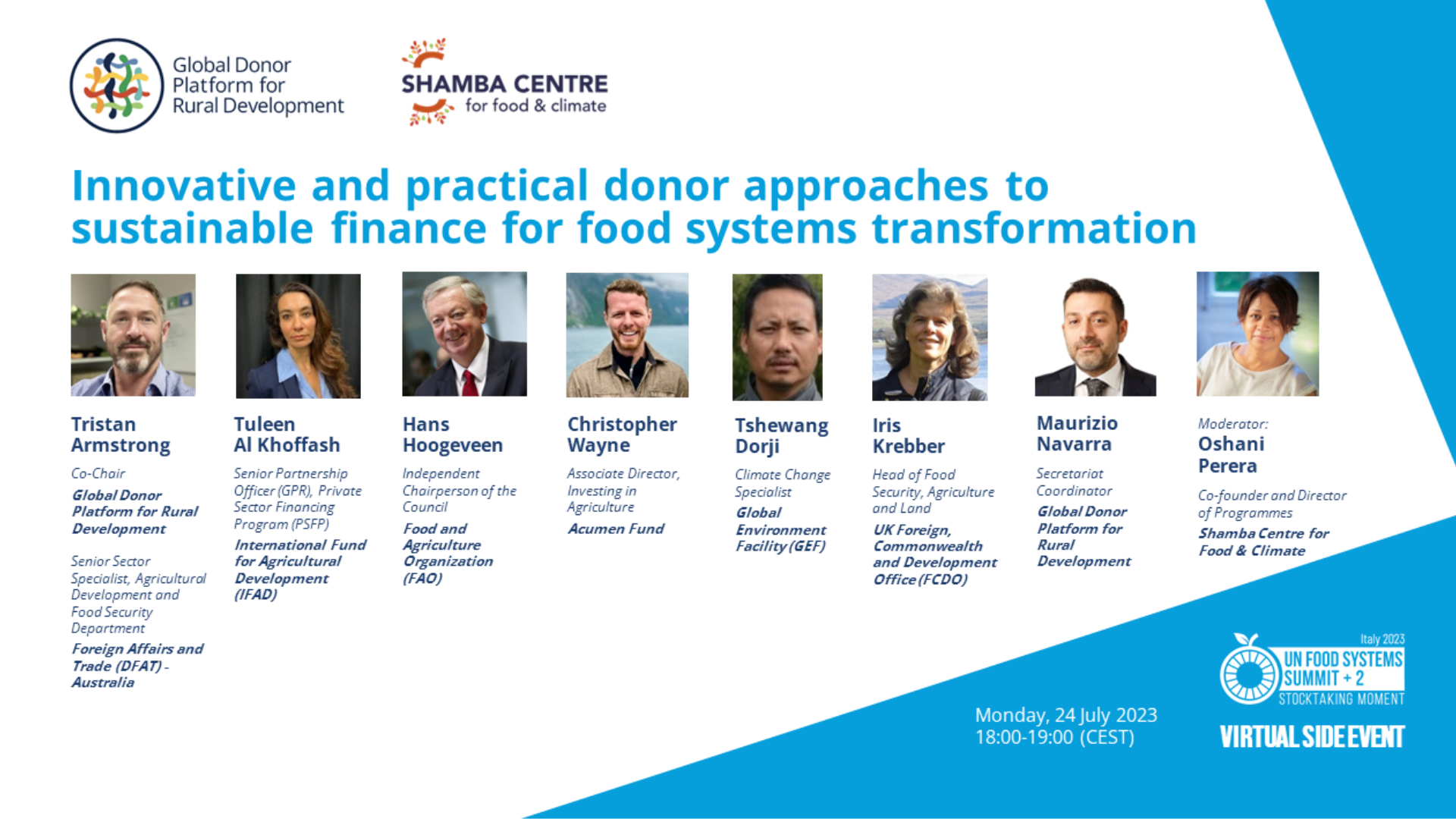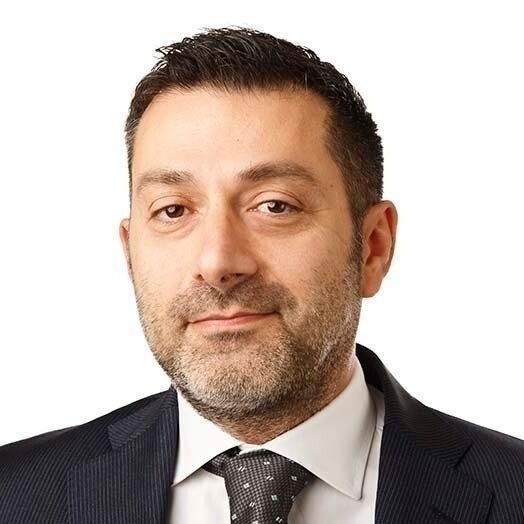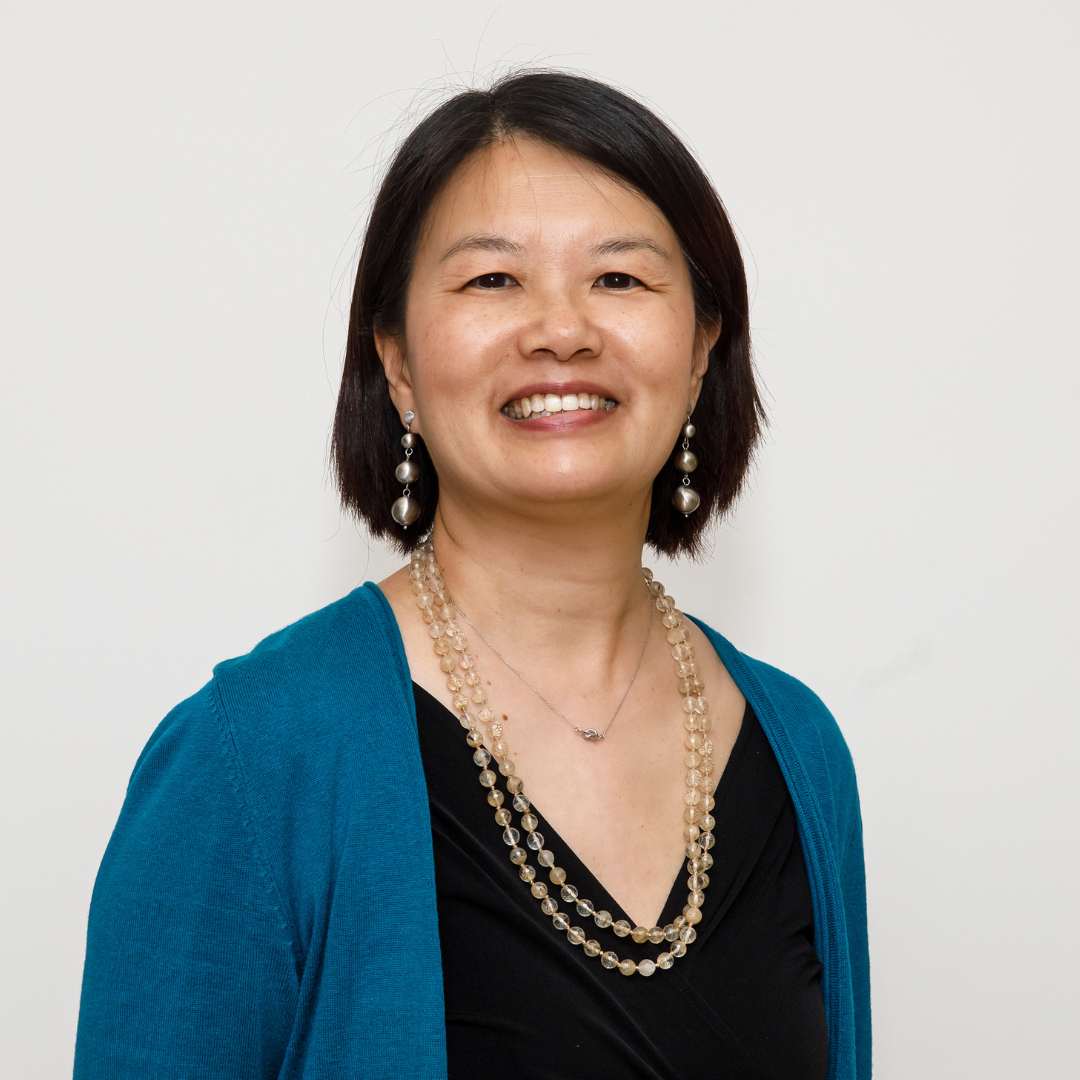Reflections from our UN Food Systems Summit +2 Stocktaking Moment side event
Two years following the UN Food Systems Summit, the Global Donor Platform for Rural Development and the Shamba Centre for Food & Climate hosted an official side event at the UNFSS+2 Stocktake on 24 July 2023. The event explored how donors and public funds are working continuously to enhance the impact of their investments to achieve the SDGs and transform food systems.
Links
Key questions explored:
Participants at the event shared experiences on their collective efforts to make funding more catalytic in order to make genuine progress in ending hunger. They discussed the following:
- How can donors make their funding more catalytic?
- How can Official Development Assistance (ODA) for food systems better align with and synergize with other sources of development finance, such as climate finance, gender finance and emergency assistance?
- To what extent should donors utilize their ODA grants and concessional loans to mobilize additional development finance from philanthropic and private finance providers?
- How important is public funding for de-risking investments in food systems?
Highlights from the side event:
Tristan Armstrong, Co-Chair of the Donor Platform, recounted that the global community was challenged in 2021 to significantly increase investments in food systems transformation by an ambitious US$330 billion per year as detailed in the Ceres 2030 report. While there are numerous methodologies for estimating ODA funding for food systems, the consensus is that current amounts are around US$20-30 billion per year. Tristan emphasized the need for bold actions, risk-taking, and creating new partnerships to bridge the funding gap. “We must learn from the evidence that is already out there.” ddressing climate, nature, and water risks, alongside operational and revenue risks of new designs and technologies in developing countries.
Tuleen Alkhoffash, Senior Partnership Officer, International Fund for Agricultural Development (IFAD), shed light on blended finance to lower commercial risk and leverage private sector investment. She explained mechanisms such as guarantees, which are provided by Multilateral Development Banks (MDBs) to commercial banks’ lending to SMEs. Guarantees serve as cash collateral against loan defaults for lenders who are considered high-risk (oftentimes women or the rural poor). She also elaborated on the use of incentive payments, when a borrower takes out a loan but receives an incentive in return because of the nature of the loan (i.e. energy saving, green). Cashback incentives are also provided through MDBs by donor grants.
Hans Hoogeveen, Independent Chairperson of the Council, Food and Agriculture Organization of the United Nations (FAO) acknowledged the bold statements made during the UNFSS+2 Stocktaking Moment about creating a new financial architecture and the efforts of many, including the World Bank, to set up data systems on financing for food systems transformation. Hans pointed out that while data is crucial, countries know what they are investing in their food systems, and efforts from the World Bank and IMB are the keys to unlocking private sector investments at a massive scale through risk financing.
Christopher Wayne, Associate Director, Investing in Agriculture, Acumen, shared the organization’s model of investing patient capital to empower small and medium-sized enterprises. The approach joins the rigor of private markets with the flexibility and social ambition of philanthropy. Christopher provided examples of patient capital being used to support investments, the returns of which are then recycled into new investments and associated costs.
Lizard Earth, a cocoa aggregator in Sierra Leone, had been facing difficulties with inefficient agroforestry practices and supply chains. Lizard Earth structured a business model around a 365-day climate-resilient agricultural training programme for farmers, including a community-level fermentation and drying centre and centralized processing and management. This model helped farmers grow better cocoa and sell it at a premium price, creating transformational value for smallholders. The farmers reported a minimum income increase of 30%, and 97% reported improved quality of life.
EthioChicken, a poultry company originally based in Ethiopia, provides small farmers with disease-resistant, productive chickens that thrive in local, rural conditions. In 2014, Acumen invested US$500,000 into the company, which was selling 600,000 chickens per year at the time. Today, the company sells 600,000 chickens per week and has expanded to other countries, including Kenya, Rwanda, and Uganda. Christopher concluded, “We need entrepreneurs with big ideas to take big swings, and they need patient capital willing to take and share risks with them.”
Tshewang Dorji, Climate Change Specialist, Global Environment Facility (GEF), highlighted the interlinkages between climate and food systems financing for “sustainable food systems that are nature positive, resilient and pollution reduced” to make a visible impact on the ground. GEF Least Developed Countries Fund (LDCF) administers grant funding support for climate change adaptation action in 46 least-developed countries, 66% of which are in Africa. This four-year strategy will provide US$20 million per country through four thematic focus areas, (1) agriculture, food security and health, (2) water, (3) early warning and climate information systems and (4) nature-based solutions. Tshewang noted the synergies of climate and food systems financing, stating that “each of these thematic areas is closely interrelated in what happens in the food system sector.”
Iris Krebber, Head of Food Security, Land and Agriculture and Senior Adviser, Foreign, Commonwealth and Development Office (FCDO) stressed the importance of transparency in blended financing and alignment of objectives among various parties involved. “If we want to help smallholders invest in their future, beyond the next five years, [we must] be clear about what really benefits them and what prevents maladaptation. All these things need to be on the table, need to be looked at, need to be agreed before investment choices are made and agreed, and they need to be accompanied with robust monitoring.” She also stressed the significance of de-risking investments and leveraging donor grants to attract private-sector funding.
In summary: Where do we stand and what’s next?
The event speakers collectively stressed the critical need to increase private sector collaboration, de-risk investments, and revitalize small and medium-sized enterprises to achieve food systems transformation at scale; business as usual will not be enough. The Shamba Centre for Food & Climate’s co-founder and event moderator Oshani Perera concluded by emphasizing the critical role of “trust, collaboration and the systemic link between the providers of philanthropy, capital, and risk money” to bring about meaningful change.
For further insights into the GDPRD workstream with the Shamba Centre on sustainable finance for food systems, explore how donors, international public funds, and philanthropic organizations can make their funding more impactful and serve as a catalyst for achieving SDG 2. Reach out to us to be part of the interviews and workstream.

Speaker Presentations and Resources:
Tuleen Alkhoffash (IFAD)
Presentation
Hans Hoogeveen (FAO)
Presentation
Christopher Wayne (Acumen)
Presentation
Tshewang Dorji (GEF)
Presentation
Additional readings from Iris Krebber (UK-FCDO)
Policy Brief: Private sector and food security, CASA Programme
CASA Programme website
Co-organized by the Global Donor Platform for Rural Development and the Shamba Centre for Food & Climate, this official side event took place on 24 July 2023.


